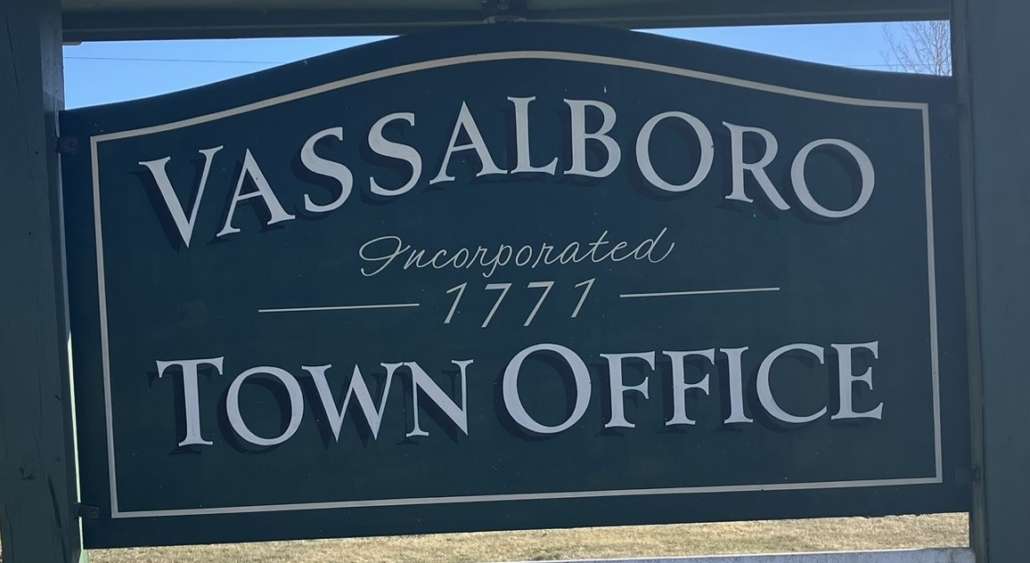
More than 100 voters attended Vassalboro’s town meeting on June 2. (photo courtesy of Aaron Miller)
Vassalboro’s annual town meeting, held Monday evening, June 2, in the Vassalboro Community School gymnasium, had many familiar elements.
More than 100 voters attended, as usual, including all of the select board and school board and most of the budget committee. They went through about the usual number of articles, 41 this time, in about the same amount of time, from 6:30 to 9:50 p.m.
As usual, many articles asked for funds for the next fiscal year. Amounts were in some cases higher than in the past, as voters pointed out. As usual, voters made no drastic changes in officials’ recommendations.
The frequent cries of “Can’t hear you!” were also familiar, as the microphone passed from speaker to speaker.
Two differences were a new (to Vassalboro) moderator, Jeffrey Frankel from Windsor, and at intervals a new tone, a repetition of the spring’s differences among the select board, budget committee and school board. Budget committee members participated more than usual, explaining their positions as a committee and occasionally as individuals.
Town Manager Aaron Miller had arranged for Frankel to run the meeting, since former moderator Richard Thompson has retired.
Miller’s introductory statement summarized proposed expenditures and explained why he and select board members recommend increases, especially in capital reserve funds, needed to avoid even larger future increases.
Miller said town officials intend to “factor” – increase all property values by a selected percentage – this year. Otherwise, he said, Vassalboro’s valuation will be so low that the town’s state revenue sharing and other benefits would be cut.
Town officials anticipate a tax increase for the fiscal year that begins July 1 (with the first quarterly payment due Sept. 29). However, Miller said, the figures calculated in the 2024 town report (page 19) are not final.
After Frankel’s election and preliminary explanations of procedures, voters elected five budget committee members for two-year terms. They are returning members Donald Breton, William Browne, Phillip Landry and Peggy Schaffer and new member, Ben Loiko.
Voters then approved a $2.9 million municipal budget, covering town departments, after a motion to reduce the recreation and library accounts by $35,000 – mostly aimed at the recreation director’s position — was defeated.
Five requests to raise money from taxes for capital reserve accounts (Art. 6) were debated individually. Voters approved $21,600 for a public works reserve account, without discussion; and accepted the budget committee’s lower recommendations on two plow truck reserves, $50,000 (instead of the select board’s $78,000) to replace truck #6 and nothing to replace truck #2; and added $11,250 to the capital improvement reserve.
They authorized $53,738 for a new backhoe at the transfer station, although the budget committee had recommended no money this year. Budget committee member Breton said the transfer station task force has not yet made recommendations that might affect the kind of equipment needed.
Budget committee member Frank Richards said the recommendation for no money was not unanimous. “If you go cheap, you sure get beat,” he quoted, recommending action now to get a three-year no-interest financing deal.
Former select board member Lauchlin Titus commented that he had served on the select board for 12 years and been off five – and remembered discussing the backhoe during his first year on the board.
After explanations by select board chair Frederick “Rick” Denico, Jr., and budget committee member Breton, $125,000, to be kept on hand in case the Mill Hill Road bridge fails before it can be replaced, was deleted from the capital reserve article. Instead of raising the money from taxes, voters approved transferring it from the existing surplus, under the following article.
In another familiar move, voters approved a motion to discuss and vote on Art. 8 through Art. 24 as a group. They approved all after a couple questions, giving town officials typical authorizations, amending the Vassalboro Sanitary District’s charter and approving more expenditures.
Art. 25, authorizing funds for “health and welfare outside agencies” was approved at the budget committee’s recommended level of $41,116.03. That sum excludes $4,000 for Window Dressers, a group that helps low-income area residents better insulate their windows. Local head Holly Weidner explained that funds are not needed next year, though she is likely to request money in 2026-27.
To pay Delta Ambulance’s 2025-26 bill, voters approved the budget committee’s recommended $46,932. Denico said the figure will cover the bill with the offered early payment discount. Select board members had recommended the undiscounted amount, fearing Delta’s bill would be due before the Sept. 29 tax payments come in and the town would be short of ready money.
School Superintendent Alan Pfeiffer introduced the 2025-26 school budget, reminding voters of the maintenance needs of the 33-year-old building in which they were sitting. School board members distributed a letter from board chair Jolene Gamage and a two-page explanation of relations between the school board and budget committee.
Budget committee member Dallas Smedberg chastised the school board for not sharing a detailed budget in time for budget committee members’ review. Gamage replied that budget committee members had been welcome at all school board budget discussions, and added that school board members themselves had not had all the figures they needed on time.
Voters then approved the $10.4 million school budget as presented. Frankel said state law required a counted vote on three articles: he counted one or two negative votes on Art. 38, none on Art. 39 or Art. 40.
Town meeting will reconvene at 8 a.m. Tuesday, June 10, in the town office meeting room. Voters will decide whether to affirm the 2025-26 school budget they approved June 2, and will conduct local elections.
To be elected are one select board member, two school board members and (because the amended Sanitary District charter was approved) five members of the Sanitary District board of trustees.
The list of candidates is on the town website, Vassalboro.net, under the absentee ballots notice and also under the Elections heading, subheading absentee ballots.
 by Mary Grow
by Mary Grow






 On Tuesday, May 27, 2025, Northern Light Inland Hospital and clinical services ended. The facility, associated services, and most practices have been winding down services and working to transition patients to new care locations since announcing the closure earlier this year.
On Tuesday, May 27, 2025, Northern Light Inland Hospital and clinical services ended. The facility, associated services, and most practices have been winding down services and working to transition patients to new care locations since announcing the closure earlier this year.